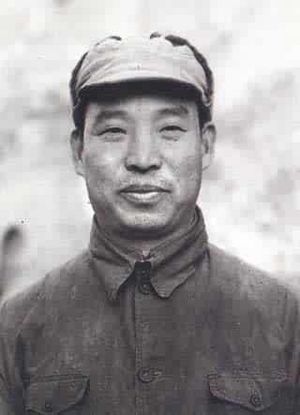Peng Zhen facts for kids
Quick facts for kids
Peng Zhen
|
|
|---|---|
| 彭真 | |
 |
|
| 4th Chairman of the Standing Committee of the National People's Congress | |
| In office June 18, 1983 – April 13, 1988 |
|
| Preceded by | Ye Jianying |
| Succeeded by | Wan Li |
| 1st Secretary of the Central Political and Legal Affairs Commission | |
| In office March 1980 – May 1983 |
|
| Succeeded by | Chen Pixian |
| First Secretary of the Beijing Committee of the Chinese Communist Party | |
| In office December 13, 1948 – May 1966 |
|
| Preceded by | Office created |
| Succeeded by | Li Xuefeng |
| Personal details | |
| Born | October 12, 1902 Houma, Shanxi, China |
| Died | April 26, 1997 (aged 94) Beijing, China |
| Political party | Chinese Communist Party (1923–1988) |
| Spouse | Zhang Jieqing |
| Peng Zhen | |||||||||
|---|---|---|---|---|---|---|---|---|---|
| Chinese | 彭真 | ||||||||
|
|||||||||
Peng Zhen (born October 12, 1902 – died April 26, 1997) was a very important leader in the Chinese Communist Party (CCP). After the Communists won the Chinese Civil War in 1949, he led the party in Beijing. Later, he faced difficulties during the Cultural Revolution because he disagreed with some of Mao Zedong's ideas about art and government. He was later able to return to his leadership roles.
Contents
Peng Zhen: A Key Leader in China
Early Life and Joining the Party
Peng Zhen was born in Houma, a city in Shanxi province, China. His original name was Fu Maogong. He joined the Chinese Communist Party (CCP) in 1923. He was one of the first members of the CCP in Shanxi province.
In 1929, Peng Zhen was arrested. Even while in prison, he continued to work secretly for political causes. He was released from prison in 1935. After his release, he helped organize a movement to fight against the Japanese forces that had invaded China.
Important Roles Before 1949
Around this time, Peng Zhen was given important jobs within the CCP. He became the director of the Organization Department of the North Bureau of the CCP. He also worked as a vice-president at the Central Party School. This school trained future leaders of the party. He also directed the CCP Policy Research Office.
In 1945, he was part of committees that studied the party's history. He also helped organize the Communist Party's 7th National Congress. This was a big meeting for the party.
After the war, in September 1945, Mao Zedong sent Peng Zhen to lead the Communists in Northeast China. He worked with Lin Biao to direct military actions. However, the Communist forces faced setbacks against the Nationalists. Peng Zhen was later removed from his leadership role in the northeast.
Leading Beijing and Facing Challenges
Peng Zhen became a member of the CCP Central Committee in 1944. He also joined the Secretariat of the CCP Central Committee. These were very high-level positions. He became the First Secretary of the Beijing Municipal Committee. He also served as the Mayor of Beijing starting in 1951.
From 1956 to 1966, he was a member of the Politburo. This is a small, powerful group of leaders in the CCP.
In April 1966, Peng Zhen faced difficulties with Mao Zedong. He was in charge of a group preparing for a "cultural revolution." However, he disagreed with Mao's idea that all literature should support the government. He was accused of working against the revolution. He was removed from his position in May 1966. This event was an early part of the Cultural Revolution. Other leaders like Lu Dingyi, Luo Ruiqing, and Yang Shangkun also faced similar problems.
Return to Power and Later Life
Peng Zhen survived the Cultural Revolution. He was later cleared of the accusations against him. This happened when Deng Xiaoping came to power. Peng Zhen then became the Secretary of the Central Political and Legal Affairs Commission. This group oversees law and order in China. He had held a similar role before.
Starting in 1983, he became the Chairman of the Standing Committee of the Sixth National People's Congress. In this role, he worked to make the Congress more powerful. Peng Zhen retired from his main political jobs in 1988.
Peng Zhen passed away on April 26, 1997, at the age of 94. He was honored greatly by the party and the state. His official obituary called him a "great revolutionary" and an "outstanding expert in the affairs of the state." It also said he helped create the legal system in China. He was seen as one of the Eight Elders of the CCP. This was a group of very influential older leaders.
Images for kids
-
In 1965, Peng Zhen with Mao Zedong, Sihanouk, and Liu Shaoqi on the Tiananmen Gate.
See also
 In Spanish: Peng Zhen para niños
In Spanish: Peng Zhen para niños
 | Percy Lavon Julian |
 | Katherine Johnson |
 | George Washington Carver |
 | Annie Easley |



